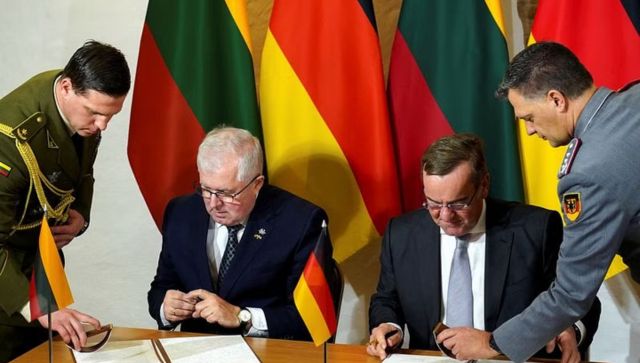A German brigade consisting of approximately 4,800 soldiers stationed in Lithuania, near the Russian border will be combat-ready by 2027, according to the defence ministers of both NATO members. The announcement comes after signing an agreement on German troops’ first permanent foreign deployment since World War Two. German Defence Minister Boris Pistorius compared this “historic” agreement to the deployment of allied forces in West Germany during the Cold War, aimed at defending Western Europe in the event of a Soviet attack. “The eastern flank has now moved to the east, and it’s the duty of Germany to protect it,” Pistorius told a joint press joint conference with his counterpart in Lithuania, which borders both Russia and its close ally Belarus. Following Russia’s invasion of Ukraine in February 2022, NATO has pledged to strengthen its presence on the alliance’s eastern border. Most of the units will be arriving in 2025-2026, and they and their families will get “attractive conditions”, including German-language schools, kindergartens, housing and flight connections, said Pistorius. “The speed of the project clearly shows that Germany understood the new security reality”, he added. Germany already leads NATO’s multi-national battle group in Lithuania of some 1,000 troops, which will be integrated into the brigade. Lithuania will spend about 0.3% of its gross domestic product over the next several years to build housing, training grounds and other infrastructure for the German troops, and will probably have to raise taxes for that, said Laurynas Kasciunas, head of parliamentary National Security and Defence Committee. “All political parties, left to right, agree that this is a priority. We will find the resources needed,” Kasciunas told reporters. The nation of 2.7 million, once ruled from Moscow but now part of both the European Union and NATO, has a land army of about 8,000 professional soldiers and conscripts. “We should expect not only good scenarios but also the very worst scenarios. So we must be ready … Russia remains the main threat to us and NATO”, Lithuanian Defence Minister Arvydas Anusauskas said. Germany promised to permanently deploy the brigade-sized unit in June, ahead of the NATO summit in Vilnius but has only now committed to a timeline. With inputs from Reuters.
German Defence Minister Boris Pistorius compared what he called a “historic” agreement to the stationing of allied forces in West Germany during the Cold War, deployed to defend Western Europe in case of a Soviet attack.
Advertisement
End of Article


)

)
)
)
)
)
)
)
)



